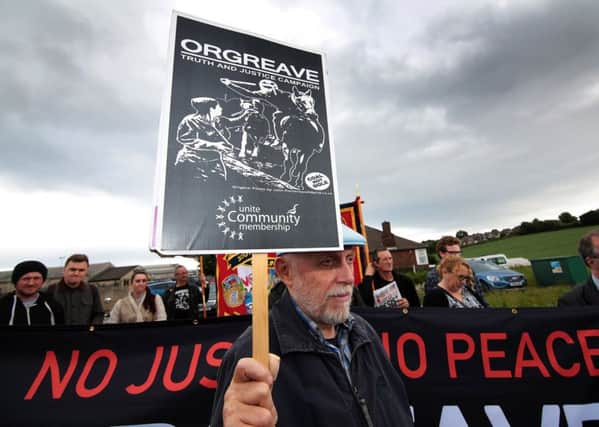Jayne Dowle: Our public duty to support South Yorkshire Police at a time of crisis


In the wake of the terrible truths we have learned about Hillsborough, and in the midst of calls for an inquiry into the 1984-85 Miners’ Strike at Orgreave, following the exclusive revelations made by The Yorkshire Post, this has extra poignancy.
There is a burning need to ask what we expect the police to do for us. There is also an onus placed on us – what can we do to help them achieve this?
Advertisement
Hide AdAdvertisement
Hide AdThe unofficial motto of British police runs that “the police are the public and the public are the police”. These are the words of Sir Robert Peel, the founder of the Metropolitan Police.
Until I came across this principle recently, I have to admit I had never thought of the relationship like that.
It does, however, underline all the recent reforms to policing in this country, such as the publication of crime maps and the election of police and crime commissioners.
It also underpins the reforms to the structure of the police force, including direct entry into senior ranks and also the creation of the College of Policing.
Advertisement
Hide AdAdvertisement
Hide AdIt ran also through the extremely powerful speech made this week to the annual Police Federation Conference by the Home Secretary Theresa May. The points she made about the importance of police taking victims of domestic abuse seriously, the need to adapt and evolve in order to counter modern felonies such as cyber-crime and the concerns about the success of restorative justice – the process by which criminals and victims meet face to face – all reflect how the police strive towards creating a better relationship with the public.
However, what has not been highlighted in this relationship is how the public can best work towards creating a better relationship with the police. In my town, Barnsley, right at the heart of South Yorkshire, we have a particular challenge on our hands. Against the disturbing backdrop of Hillsborough and Orgreave, we live with a growing plethora of issues which put law-abiding families and individuals at risk.
To be fair, in many respects, we are no different from any other town. Generalised anti-social behaviour, intimidation of the elderly and vulnerable, car crime, burglary, substance abuse and hate crime is no worse here than it is in many other places. Still, it is my town, and I want it to be a safe and harmonious place to live, not somewhere where I fear for my own safety and that of my partner and two children.
I’m a decent citizen. I presume you are too. What then can we do to help the police do their job as effectively as possible, and in doing so, improve the fragile trust between them and us? Over and above all, we should speak up. Too often, we feel that “it’s not worth saying anything”.
Advertisement
Hide AdAdvertisement
Hide AdIt is. In our area, for instance, we appear to have a growing problem with illegal drugs. There is now barely a day goes by when either myself or my partner doesn’t witness what looks like a drug deal taking place, on a street corner or in a car park. Even my children, who are 10 and 13, recognise it.
At first, we thought it was just an occasional occurrence. We turned a blind eye and hoped it would go away. When something is so blatant though, it is our duty, both as members of the public and parents, to report this matter to the police. When we have done so, we have found that the officers we speak to are far from dismissive of our concerns. What we see happening around us is vital information for them; even the PCSOS (police community support) officers who have been sent to patrol locally can’t see and hear everything.
It is also important for us citizens to recognise the bigger picture. Where there are drugs, for instance, there is associated crime. Those who need money for a fix will steal anything in order to obtain it. That tampering with your shed or damage to your garage door? Don’t ignore it. When we have had occasion to be concerned, we have found that ringing the non-emergency 101 number, which goes through to South Yorkshire police headquarters in Sheffield, is very effective.
We have also found that the community-based officers dispatched to investigate are as far removed from the negative stereotype of the arrogant, self-serving policeman revealed by the Hillsborough inquiry as it is possible to be. Their frustration with fighting crime in communities in which few people even want to talk to the police is unspoken but clear.
Advertisement
Hide AdAdvertisement
Hide AdIn this, we cannot deny the role we have to play as individuals. We cannot help South Yorkshire Police to rebuild trust and destroy the corrosive culture which has poisoned their reputation unless both sides are prepared to meet halfway. Yes, in an ideal world, the police should indeed be the public, and the public should be the police. It is time for both sides of the relationship to accept, recognise and implement this.